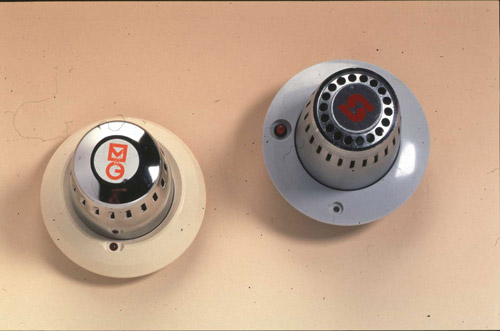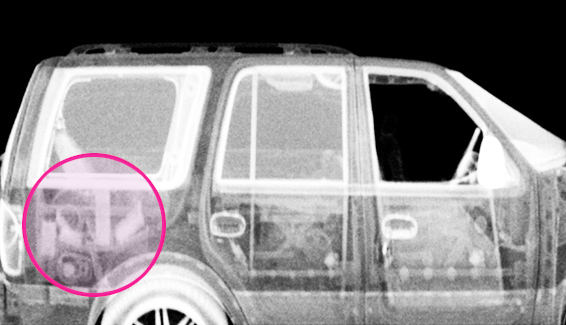On the lookout for anything unusual…
Radioactivity nowadays plays an important role in ensuring the security of people and of goods – a development whose advantages may not be felt in the span of one generation. In ensuring security at work, in airplanes, boats and trains, or even in detecting drugs and explosives, radioactivity is a useful tool in our attempts to remain safe.
Offices, factories, public spaces: wherever you go you are bound to be confronted with lots of smoke detectors – so commonplace that they pass almost unnoticed to most of us. Sensitive to tiny amounts of smoke, they help protect us from the risk of fire.

Smoke detectors
Fire alarms capable of detecting small amounts of smoke can be found in many public spaces. A radioactive pellet inside the detector ionises the atoms of oxygen and nitrogen passing between the pellet and the detector. The presence of smoke absorbs some of the ionising rays, thereby diminishing the amount of ionisation detected. This drop in ionisation sets off the alarm.
© ANDRA
The dials, buttons and levers in airplane cockpits are now luminescent: an end result achieved thanks to paint containing small amounts of tritium. The risk posed to the pilots is negligible, as tritium emits electrons with such low energies that they cannot even pass through the glass of the dials.
Some applications of radioactivity are also used to ensure the quality of industrial production. The welding performed on planes – the propeller blades or the engine, for instance – can be tested by checking how even the layers are. Similar processes are applied to railroad tracks – especially for those trains travelling at very high speeds.
In order to make the propeller blades in airplanes more resistant to rust and general wear and tear, they are coated with a fine layer of chromium: the technique used for such a precision coating relies on radioactivity.
When a ship leaves port, it passes through a well-lit and properly maintained channel. The level of silt present in the water is tested by radioactive detectors, and the filters operating in the channel are set accordingly. Such water testing is crucial to avoid both accidents and unnecessary filtering.
Unexpected uses of radioactivity also abound – one of the more commonplace is the use of radiation to keep insect populations down. In African and Middle East countries, for instance, dangerous insect infestations have been prevented thanks to the sterilisation of thousands of male flies.

A smuggler car
A gamma rays radiography allowed customs to localize a large amount of cash money hidden in the back of a car that its owner, a smuggler, attempted to pass in contreband.
© DR
Ports, airports and customs now use small accelerators generating gamma rays ito nspect containers, cars and lorries and scan their cargo For instance, a 9 MeV gamma-ray source can penetrate up to 410 mm of steel and see through densely packed containers.